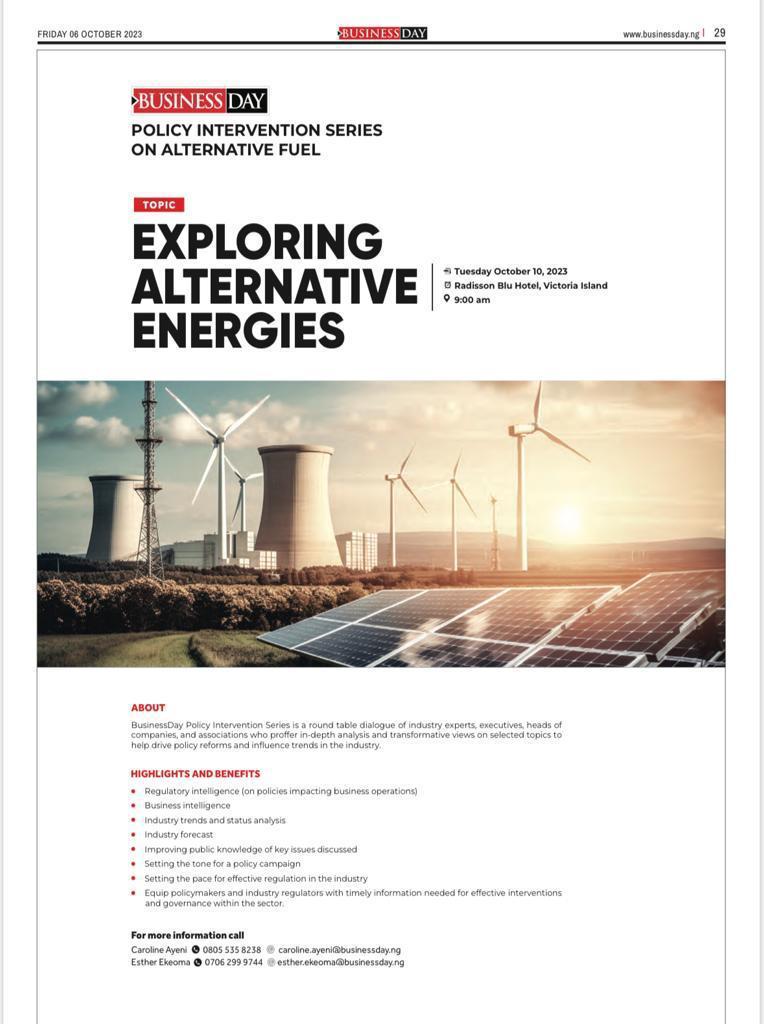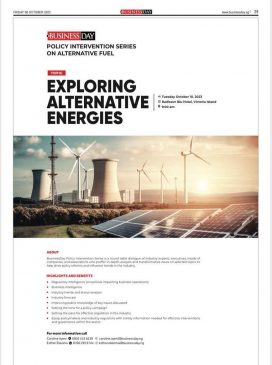Stakeholders identify how Nigeria can transit from petrol to alternative energy
By Yusuf Yunus
Stakeholders in energy sector have identified what Nigeria can do to successfully transit from petrol to alternative energy fuel
The stakeholders who spoke at one day BusinessDay/MOMAN seminar in Lagos .
The Policy Intervention Series on Alternative Fuel brought together industry experts, stakeholders, and thought leaders to discuss critical issues regarding alternative energy sources and their role in shaping the future of our nation’s energy landscape.
The challenges and opportunities facing transition energies such as gas (LPG and CNG) and alternative energies such as solar, biofuels, and EVs were discussed, and solutions were proffered.
Key Highlights and Takeaways:
Policy Intervention: The discussion began by acknowledging the significance of BusinessDay’s policy intervention initiative, especially in light of a new administration.
The event marked an opportunity for policy realignment, considering the promises and commitments made by the new government.
Operator Contribution: Participants recognized that this juncture presents a unique opportunity for industry operators to actively engage in policy creation, formulation, and the subsequent steps toward policy implementation and execution.
Appropriate Pricing: The advantages of appropriately pricing petroleum products, such as PMS (Petrol), were emphasized. Instead of artificial subsidies, appropriate pricing can make alternative energies more appealing to consumers, fostering a shift toward more sustainable options.
Solar Energy Uptake: The removal of subsidies has led to a significant surge in the adoption of solar energy solutions.
Notably, companies like TotalEnergies have made substantial investments in solar power, resulting in considerable cost savings and environmental benefits.
TotalEnergies has over 250 retail outlets in Nigeria running on solar.
Accessibility of Alternative Energies: Participants dispelled the myth that alternative energy sources are inaccessible, even in urban settings.
Sterling Bank provided examples of solar-powered branches and a 17-story office building (Sterling Towers on Marina), highlighting the versatility of solar solutions.
Ethanol Blending: Ethanol blending in petrol was discussed as an avenue for significant savings, reaching up to 49 Naira per liter.
This practice can also support local farming and agro-processing industries, particularly using abundant resources like cassava.
Electric Vehicles (EVs): Concerns about EV charging infrastructure were addressed.
While electric vehicle charging stations are emerging, individuals can utilize solar energy to charge their electric vehicles, promoting sustainability.
Conversion to CNG: Notably, several entities are actively converting their fleets and generators from diesel to compressed natural gas (CNG), achieving substantial cost savings, with some reporting up to a 70% reduction in expenses.
Government Support: Participants emphasized the need for targeted government interventions for alternative energy startups and a shift away from traditional petroleum subsidies.
Such initiatives can expedite the transition toward a more diversified and efficient energy mix.
Cost Reduction Strategies: Businesses and individuals were encouraged to explore cost-effective strategies, including the adoption of alternative energies in their operations.
Additionally, participants highlighted the urgency of eliminating unnecessary dollar-based pricing, reducing operational costs.
Financing Solutions: Sterling Bank shared insights into financing challenges within the alternative energy sector and presented its financing solutions to support the growth and development of alternative energy projects and initiatives.
Entrepreneurship Opportunities: The Policy Intervention Series highlighted the promising entrepreneurship opportunities associated with supporting small and medium-scale enterprises (SMEs) within the alternative energy sector.
These opportunities have the potential to stimulate economic growth and job creation.
Retail Outlets of the Future: The filling station of the future will transcend its traditional role as a refueling point for vehicles.
Instead, it will evolve into a dynamic hub offering a diverse range of cleaner energy options.
These stations will no longer rely solely on traditional fossil fuels but will provide consumers with a wide array of sustainable energy choices.
In conclusion, the BusinessDay Policy Intervention Series on Alternative Fuel underscored the pivotal juncture at which our nation’s energy sector stands. Removing subsidies, coupled with strategic policy interventions and industry collaboration, has the potential to reshape our energy landscape into a more sustainable and prosperous future for all





